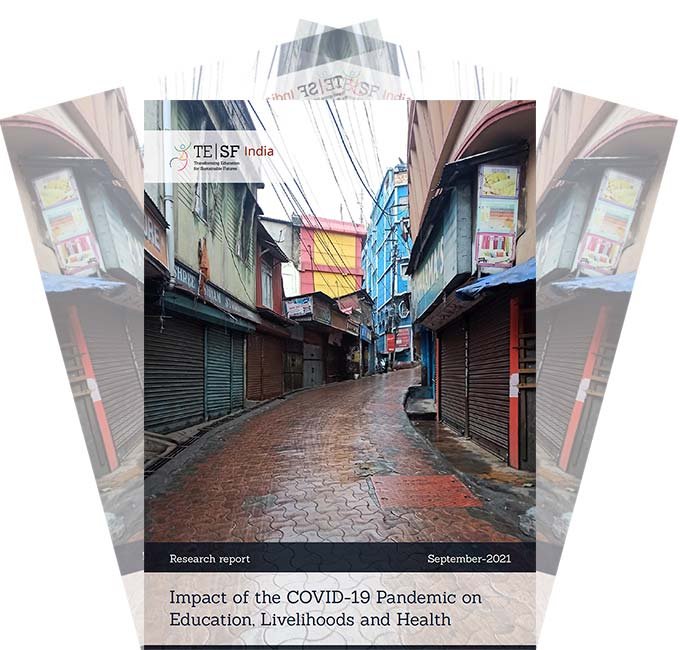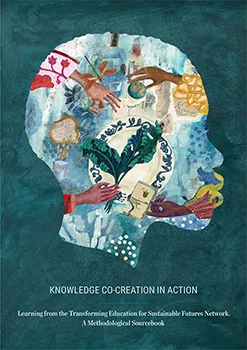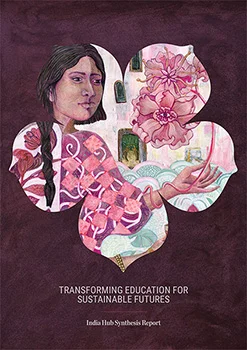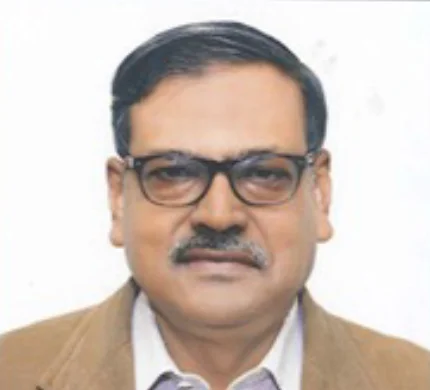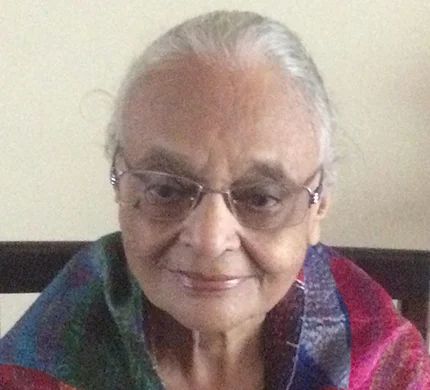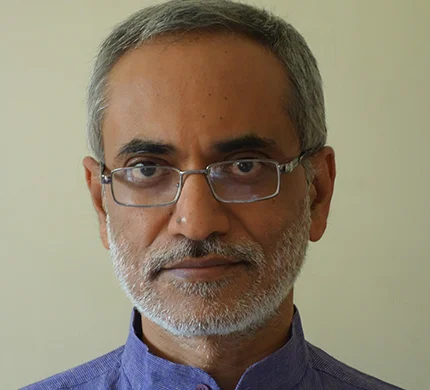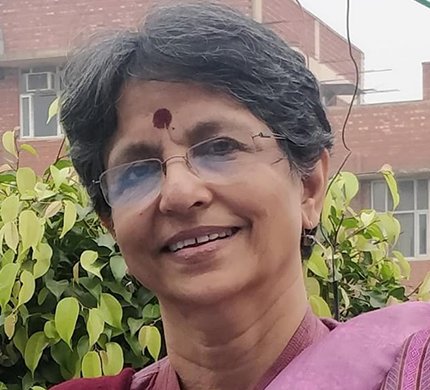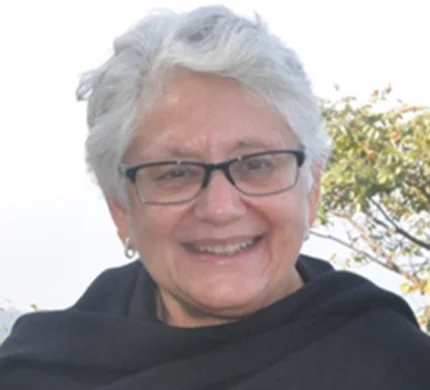Introducing Reimagining Education for Equity – Interrogating Policy and Practice
What role does education play in achieving sustainable development goals? How can education drive transformative changes leading to environmentally and socially just societies? How can key stakeholders be involved in creating inclusive, equitable, and empowering learning environments that prepare individuals and communities for a rapidly changing world?
The course Reimagining Education for Equity – Interrogating Policy and Practice addresses these questions by first examining and problematising the role education has played in sustaining social inequalities; and then deliberating on how education can be transformed to create empowered teachers and students towards attaining an equitable, just, and sustainable future.
This course derives from the results of a four-year four-country research programme on ‘Transforming Education for Sustainable Futures’ or TESF. It is led by Professor Poonam Batra, a TESF co-investigator and one of India’s leading academics with four decades of interdisciplinary experience across elementary, teacher and higher education practice and policy in India.
The MOOC contains 5 modules, with each module requiring 4–6 hours of learning and reading time.
It is designed to make TESF research and examples of transformational education accessible to practising teachers, student-teachers, the wider teacher education and policy community, and other stakeholders with an interest in education.
Objectives of the course
By the end of the course, students will be able to:
- Identify the continued impact of the colonial legacy of education on contemporary Indian education system and practice.
- Critically reflect on India’s education policy trajectories and examine their impact on school and teacher education.
- Critically examine prevailing ideas and practices that dominate curricular and pedagogic approaches and which sustain gender, economic and social asymmetry.
- Develop capacities that enable deeper understanding of complex interconnections between education, communities, social and political contexts that influence inclusion/exclusion of children in learning spaces.
- Develop professional repertoires that enable the integration of lived experiences and identities of students in the teaching-learning process.
- Recognise the importance of and understand processes that encourage children’s voice and agency in schools, along with developing teacher’s autonomy to bring about transformative change in and through education.
- Discuss ideas and thoughts rooted in southern sources of knowledge and develop perspectives of transformative education towards equitable, just and sustainable futures.
Introduction to the Course | Amir Bazaz
Reimagining Education for Equity: A Trailer | Poonam Batra
Education, Margins, and the City
Background Papers and Knowledge Resources
As part of the project, a series of background papers are prepared with evidence-based analysis and arguments to identify gaps in knowledge (s) that help formulate significant questions for TESF research in India.
India Briefing Note: Transforming Education for Sustainable Futures
The briefing note provides an overview and introduces the interface of education and sustainable development in India. The note raises key research questions that need to be addressed in order to examine education for sustainable development, education for sustainable cities and communities, and education for climate action.
Knowledge Co-Creation in Action: Learning from the Transforming Education for Sustainable Futures Network: A Methodological Sourcebook
Suggested Citation:
TESF Collective. 2023. Knowledge Co-creation in Action: Learning from the Transforming Education for Sustainable Futures Network. A methodological sourcebook. Bristol, TESF.
Transforming Education for Sustainable Futures: India Hub Synthesis Report
Suggested Citation:
Batra, P., Bazaz, A., Dixit, S., & Sadh, S. (2023). Transforming Education for Sustainable Futures: India Hub Synthesis Report. New Delhi, TESF India-IIHS
India Background paper
The country paper highlights some of the key concerns across the sectors of school, higher and teacher education. The paper examines the contours of and potential for Education for Sustainable Development (ESD) that includes addressing questions of environmental, social, economic and epistemic justice in school and higher education contexts; exploring linkages between ESD and climate change education, education on sustainable cities and communities and identifying novel methods of wider public engagement and social education.
बैकग्राउंड पेपर: भारत
The country background paper- Hindi Translation
The Case for Transformative Public Education: Responding to COVID-19 now while addressing long-term underlying inequalities
The briefing paper clarifies the meaning of transformative public education and how it responded to the COVID-19 pandemic. It explores why transformative public education matters in addressing long term underlying risks to the communities. In addition, it also provides suggestions for governments, state welfare actors and community leaders who seek to work with transformative public education.
Building a reciprocal relationship between education and SDG 11: a prerequisite for urban transformation and sustainability: A TESF Background Paper
The paper discusses why the building of a reciprocal relationship between education and SDG 11 is crucial and is a prerequisite for urban transformation and sustainability. It elaborates how education for all the SDGs must have an increasing urban sensitivity and be able to address the specialist needs of SDG 11. Since SDG11- sustainable cities and communities is an area that is not supported by formal and informal education curricula, urban education for sustainable development needs complex skills development that can be achieved through pedagogical innovations and different urban higher educational initiatives.
Co-Creating Education for Sustainable Futures: TESF Methodology Background Paper
The paper aims to explain the overall methodological approach and key concepts that inform the researchers within the TESF project. It clarifies the approach of ‘knowledge-co-creation’ that underpins this project and the forms it takes in the design and implementation of research projects in the area of education for sustainable futures.
Climate Change and Education
The paper is a short summary of some of the current debates and state of the research in relation to climate change and education. Its primary purpose is to support the research teams in our network, seeking to develop new community-led research agendas. It will also provide a useful starting point for others coming new to the field and seeking to develop research and action projects.
Addressing Inequalities TESF Background paper
The aim of this background paper is to examine inequality in the context of cross-cutting SDGs of poverty (SGD 1), gender (SDG 5), social inequalities (SDG 10), indigenous knowledges (SDG 16) and environmental injustice (SDG 11, 12, 13, 14 & 15). With SDG 4 (Quality Education) being central to TESF objectives, the paper aims to anchor all inequalities around the question of ‘educational inequality’ as this is both a consequence of various other inequalities and one that exacerbates other inequalities.
Transforming Education for Sustainable Futures: Foundations paper
This background paper aims to develop an initial understanding based on a critical engagement with the existing literature of how key terms that are used to frame the work of the Transforming Education for Sustainable Futures (TESF) Network Plus are understood.
Mobilising Capacities for Transforming Education for Sustainable Futures
This background paper introduces plans for collaboration, learning, and action within the Transforming Education for Sustainable Futures (TESF) research network.
Re-imagining Curriculum in India: Charting a Path beyond the Pandemic – Poonam Batra
Abstract
The Covid-19 pandemic has made visible the sharp economic, health, caste-based, gender, and educational inequalities that the disadvantaged face in India. Curriculum is ordinarily viewed as a tool for regulating and adapting modern educational systems to society’s needs and trends. But most governments have been unwilling to rethink post-pandemic education, despite the loss of livelihoods, food, and shelter – accentuated by educational inequality and institutionalised via neoliberal reforms. The current pandemic compels us to examine the meanings and purposes of education from a socio-historical perspective, to understand how questions of equity and justice, rooted in India’s Constitution, can be woven into curricula and pedagogic approaches. This article reflects on the role that curriculum can play in enabling an ecologically and socially just and connected world. This curricular response includes cognising the significance of subaltern disciplines and imagining transformative pedagogies that can help reclaim education spaces and sustain epistemic justice.
Webinar – Re-imagining Curriculum in India: Charting a Path beyond the Pandemic
Based on the paper a webinar was organised by the School of Education, University of Bristol.
Videos
TESF | Interrogating Education | Intervening to Transform Education Towards Sustainable Futures
The TESF India team recently presented country-level synthesis at the TESF Network Synthesis workshop held at Kigali, Rwanda from 6 -10 March, 2023. A short TESF India Film focusing on issues pertaining to education and its practice; challenges of the urban and cities; issues of climate change and the role of education; how these relate to gender, social and economic inequality; and how the various TESF India research projects problematize and respond to these issues was screened at the Kigali workshop. The film presents select narratives from the TESF India research community, foregrounds intersectional vulnerabilities in rural, semi-rural and urban contexts and offers glimpses of how education can be transformed for sustainable futures.
Virtual Inception Workshop – Day 1
Education in India and the Challenge of Sustainable Development | Poonam Batra
Introduction to the TESF project | Leon Tikly
The SDGs and India’s Development | Aromar Revi
Need for progressive universalisms to address durable inequalities | N. V. Varghese
Importance of interdisciplinarity to address the theory practice divide | Darshini Mahadevia
Legitimising and strengthening indigenous knowledge | Madhulika Banerjee
Problematising the regulatory framework for higher education | Prasad Shetty
Virtual Inception Workshop – Day 2
Transforming educational systems for social and environmental justice | Poonam Batra
Education for Sustainable Urbanisation | Aromar Revi
Education for Climate Action | Amir Bazaz
Inclusivity in the Indian education system | Sumit Bose
Strengthening the ‘public’ in India’s education system | Geetha Nambissan
Working with indigenous and marginalized communities in Southern India | Pratim Roy
Impact of the COVID-19 Pandemic on Education, Livelihoods and Health
The strict and sudden lockdown imposed by the Government of India in the third week of March 2020 to control the spread of the COVID-19 virus, made visible the inadequacy and fragility of the Indian education system and urban social protection systems. Schools and higher education institutions across the country were closed and all economic activity in cities and towns came to a grinding halt. As a result, students across the span of education and millions of workers engaged in informal work in Indian cities were severely impacted.
This research set out to understand the impact of the COVID-19 pandemic and the lockdown on the education, livelihoods, and health of the most marginalized sections of Indian society. Three major sites were chosen for this investigation: In Delhi, we examined the impact of school closure; in Bengaluru, we assessed the impact of the closure of higher education institutions; and in Tiruchirappalli (Trichy) we examined how the loss of income impacted the lives of informal workers. This investigation also provided insight into the physical and mental health condition of the studied demographic and the various state and non-state relief measures that were offered in response to the health crisis. Individual interviews were conducted online and offline with different stakeholders; online panel discussions were held with various organisations providing relief; and secondary data was collated from various reports, case studies and government documents.
